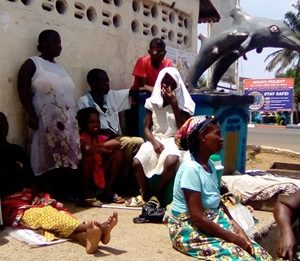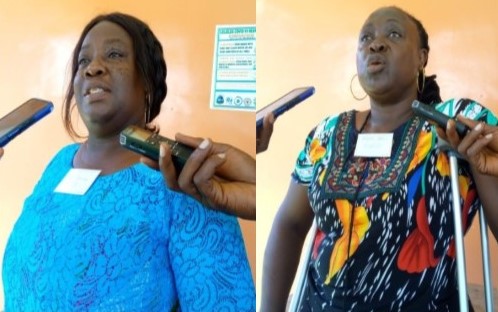PHOTO: L-R, Recadia Dennis, Naomi Harris-two PwD leaders
By R. Joyclyn Wea
Achieving 4% right to work by People with Disabilities (PwD) in Liberia is an uphill struggle.
But at least over 27 PwDs have now been employed in different line ministries, agencies and branches of government, as required by the act that established the National Commission on Disability (NCD), officials of the Commission have disclosed.
But this is not a satisfactory number, according to Madam Recadia Dennis, Director of the NCD.
Article 27 of the 2005 Act that established the NCD talked about the rights of persons living with disabilities to work and employment in Liberia.
Part of the law says that for every 100 persons employed in a public institution; 4% of said number ‘MUST’ be PwDs, an employment that should be based on merit.
The ILO Convention of 1986 also buttressed the Act recognizing the economic benefits and the other huge benefits that comes back to the country when persons with disabilities are trusted with public and private offices.
It is legislated to have them included in the workforce of the country, but the intent of what is known as a “good law” is nearly not gaining the expected results; thus causing authorities at the NCD to formulate positive means to have it achieved.
To do that, the National Commission on Disabilities is working with not only central government, but local and international partners, Civil Society Organizations (CSOs) to ensure that the law is fulfilled, in order to have the inclusion of qualified PwDs on the job market like any other ‘normal’ or able body citizen of Liberia.
The NCD Director and others have been pushing for the employment of Persons with Disabilities in keeping with the law–a dream that is yet to come true.
Madam Dennis said since 2008 the number of PwDs employed across the public sector is a little over 27 who are visible across the public sector of the country.
The exact number of PwDs employed throughout government has not been given due to what NCD officials say is due to lack of data.
Liberia is a West African country with a population of about 4.98 million people, according to the 2008 census, but its records on those with disabilities is unclear.
As was said by the NCD director, they lack date of those in that category of Liberians- no exact statistics about them in Liberia and the available records are out of date- a very old record of UNICEF study from 1997.
The UNICEF study has it that 16 percent of the Liberian population has some form of disability.
Out of that 16 percent, 61 percent struggle with free movements, 24 percent are visually impaired, seven percent have speech impairments and eight percent have an intellectual or psychosocial disability.
The Swedish International Development Cooperation Agency (SIDA) estimated in 2014 that due to the devastating civil war that ended in 2003 and the Ebola outbreak in 2014, the population of people with disabilities in Liberia is likely closer to 20 percent.
“Not that persons with disabilities cannot go to school to be qualified to take on regular jobs, but there are barriers that stand in the way for which they cannot take on jobs and government on whose shoulder the responsibility to award job rest on must work to resolve this,” she said.

Some disabled people on the streets of Monrovia
Madam Dennis mentioned that as per the law, no one should be confined to a particular job or institution because of their disability rather they must be allowed to choose where they want to be employed and what kind of jobs they want to do especially when they are qualified.
In order for the four percent employment of PWDs to come to reality, Dennis calls for a shift in the current situation by doing the needful by going by what the law says.
The advocacy to achieve the 4% right to work is ongoing. One of such programs meant to press for this was held recently at the Lutheran Compound in Monrovia’s Sinkor suburb, when the pro-PwD advocated pointed out the urgent need to make this a reality in Liberia.
Adama Dempster is a Human Rights Advocate in Liberia who has been in the area of advocating for all including persons living with disabilities in this country.
At a recent advocacy gathering in Sinkor, Dempster stressed the need for statistical information on persons with disabilities in Liberia.
He believes that current statistics on PwDs will help in knowing the different sex and people of the population.
He maintained that statistical data on PwDs will help in the area of forecasting different programs and activities that will lead to more persons with disabilities taking on regular jobs like other able body people in Liberia.
Mr. Dempster also stressed the need to look at how PwDs can access justice from different perspectives and how they can as well be employed into top positions in both public and private areas.
The Rights activist further stressed the need for political will to drive all of these different policies and conventions.
Similarly, Mr. Wilfred Gewon, a visually impaired and lecturer at the Lion Club Computer institution at the African Methodist Episcopal University (AMEU) highlighted the advantages of PwDs being employed.
According to Gewon, when persons with disability are employed, they become independent, self-reliance, and contribute immensely to development of any society.
Using himself as a case study, the visually impaired lecturer at the Methodist University said he no longer depends on his father pension benefits to make ends meet for him and family because he is gainfully employed and capacitated to underwrite expenses.
He is no long seen as a burden, but an asset to his family stressing the need for empowerment of persons with disabilities, which Gewon said has lot of advantages for them.
Naomi Harris, another inspiring woman who has fought her way through life and has gone against all odds leading to her doing very well in Liberia, despite her physical condition.
Madam Harris is the Executive Director of the National Union of Organizations of the Disabled (NUOD), a CSO that advocates for the rights and inclusion of persons with disabilities in Liberia.
They are yet to see the 4% of PwDs being employed to a satisfactory level and as CSO, NUOD is trying to see how best more advocacies can be done to have it achieved in every sectors of the country.
“Whether in the public or private sectors, people should see that PwDs are qualified and should be employed and given the opportunities to work,” Madam Harris confidently said.
Unlike in the past, PwDs are nowadays qualified to be employed in any entity, according to Madam Harris.
In time past, persons with disabilities were only seen as objects of pity and concern on streets, stretching their hands for handouts (begging) to make ends meet.
But with efforts being made on several fronts, the narration is gradually changing, with many of them now taking advantage of higher education and other vocational skills to get on path to empowering themselves for the job market.
“Every year when you check the different universities and vocational institutions, your will either have two or three PwDs coming out and that is because of the awareness and advocacies we have been carrying out, so you find out that PwDs are making use of opportunities and going to school and graduating,” Madam Harris says with smile one her face.
“The problem we have is that if I were a visually impaired person and I graduated from teacher college, I will be sent to the school of the blind to teach because they think when I go to the regular school I will not be able to teach,” the head of the disabilities union explained.
Madam Harris asserted that the reason for which the National Commission on Disabilities was established has not been met, on grounds that they are yet to achieve the 4% employment mark.
Persons with disabilities have lots of potentials and they bring to bed lots of positives that are not being highlighted by society.
According to a World Bank report, one billion people, or 15% of the world’s population experience some forms of disabilities.
Persons with disabilities, on an average as a group are more likely to experience unfavorable socioeconomic outcomes than persons without disabilities.
It was based on that that the United Nations gathered in December of 13, 2006 session to adopt highlighting issues affecting PwDs.
The Convention on the rights of persons with disability is intended as a human rights instrument with a clear, social development element. It adopts a broad categorization of persons with disabilities and reaffirms that all persons with all types of disabilities must enjoy all human rights and fundamental freedoms.
The Convention on PwD is one of the fastest negotiated human rights treaties ever in the cycle of the United Nations.
It was negotiated during the eighth sessions of an Ad Hoc Committee of the General Assembly of the United Nations.
This speaks to the importance that has been attached to those living with disabilities and the good associated with employing them like any other able body person who is well educated.
The quest form Madam Dennis is that the current 27 total of over persons who are gainfully employed be increased to achieve the 4% employment benchmark which according to her when is done, the Liberian society will have fewer beggars in the streets concerns as compare to now.
Publication of this article was made possible with support from Internews Liberia Inclusive Media Project

